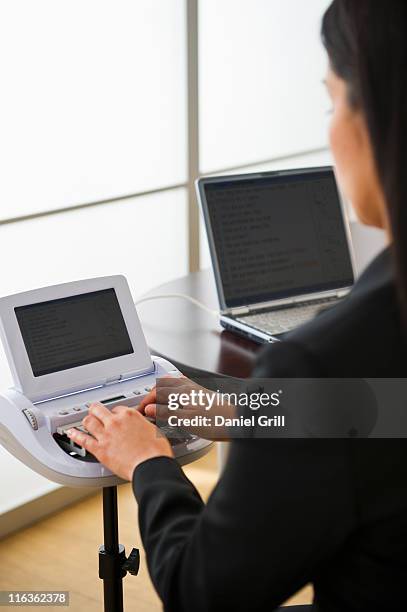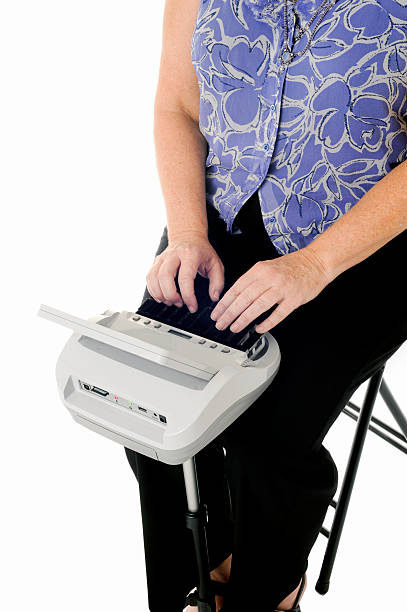Discover the Vital Abilities and Duties of a Court Typist in Today's Legal Landscape
As a court typist, you hold a vital setting in the legal system. Your abilities surpass just inputting; they entail recognizing complicated lawful terms and procedures while making sure accuracy in every file. You collaborate carefully with attorneys and courts, making your duty essential for reliable interaction. But what particular skills do you need, and how can you adapt to the ever-evolving technical landscape? Let's explore this further.
The Function of a Court Typist in the Judicial System
As the backbone of the judicial system, a court typist plays a crucial function in guaranteeing that lawful procedures are properly recorded. You are accountable for transcribing every little thing from witness testimonies to judges' rulings, recording every information with precision. Your job helps preserve a clear and long-term document of court tasks, which is crucial for future reference and appeals.In the court, you're often the unrecognized hero, silently guaranteeing that all spoken words end up being composed records. You preserve privacy, recognizing the delicate nature of lawful matters. You likewise work together very closely with clerks, attorneys, and judges to ensure the smooth flow of info. By working effectively under stress, you add to the total efficiency of the judicial process. Your attention to detail and commitment to precision not just promote the honesty of the court yet additionally sustain the wider quest of justice in society.
Crucial Abilities Needed for Court Typists
Court typists require an unique blend of skills to excel in their important function within the judicial system. First and foremost, you should have exceptional keying abilities, usually achieving rates of 70 words per min or even more. Precision is essential; even a minor mistake can lead to considerable misunderstandings in legal documents. You'll additionally need solid attention to information, making certain every word is transcribed correctly.Additionally, good organizational skills are essential for taking care of numerous situations and files efficiently. Being tech-savvy is important, as you'll make use of different software application for data processing and file monitoring. Strong interaction skills aid you connect with courts, lawyers, and various other court workers effectively.Lastly, a sense of professionalism and reliability and confidentiality is a must, as you'll take care of delicate details daily. By honing these abilities, you'll be well-prepared to contribute substantially to the court room setting.
Recognizing Lawful Terms and Treatments
As a court typist, you need to comprehend vital legal terms and procedures to do your task successfully. Comprehending these ideas not just assists you record precisely yet also ensures you can follow the circulation of court process. Let's discover the essential legal vocabulary and a review of court procedures you should know.

Trick Legal Terms
Recognizing crucial lawful terms is vital for any individual functioning in a court setting. You'll regularly encounter terms like "complainant," which describes the individual starting a suit, and "defendant," who reacts to the accusations. Understanding the difference in between "civil" and "criminal" situations helps you grasp the context of the process. Experience with "subpoena" guarantees you recognize the legal documents engaging witnesses to affirm. Additionally, terms like "proof" and "statement" are vital, as they relate straight to the info presented in court. Understanding these terms not only enhances your efficiency as a court typist but additionally guarantees that you add to the precision and clarity of lawful files. Your role hinges on precise terms, so don't take it gently!
Court Procedures Overview
Experience with essential lawful terms sets the phase for understanding court treatments. Understanding just how a courtroom features is essential for any kind of court typist. You'll come across processes like arraignments, where offenders hear costs, and activities, which are demands for a court judgment. Acquaint on your own with the functions of courts, staffs, and attorneys, as each plays a critical part in procedures. Knowing the circulation of a test-- from court option to closing disagreements-- aids you accurately catch the procedures - court typist. In addition, understanding the value of keeping a impartial and accurate document can not be overemphasized. By understanding these elements, you'll enhance your effectiveness in documenting essential court activities and contribute considerably to the legal process. Your role is essential in preserving the integrity of court records
The Effect of Innovation on Court Entering
Innovation's transformed court typing in significant ways. With digital transcription devices, you can raise performance and precision, making your task simpler than ever. Plus, remote court process have actually altered how you approach your job, calling for versatility to new formats and technologies.
Digital Transcription Devices
As electronic transcription devices proceed to progress, they're transforming the way court typists do their obligations. These tools streamline the transcription procedure, permitting you to record talked words properly and efficiently. With voice recognition software application, you can transcribe real-time procedures, lowering manual input and decreasing errors.Moreover, cloud-based platforms enable simple access to papers, so you can work collaboratively with lawful teams and ensure everyone's on the exact same page. Automated formatting attributes conserve you time on repetitive jobs, letting you concentrate on content quality.Additionally, digital tools boost safety, safeguarding delicate info via encrypted storage and regulated access. By accepting these technologies, you can enhance your performance and maintain the high standards called for in the legal field.
Remote Court Procedures
The surge of remote court procedures has actually significantly transformed the landscape for court typists. You now depend on innovation to catch and record live hearings from your home or workplace. Familiarity with video conferencing systems is necessary, as you'll need to browse them flawlessly to ensure a precise record. You'll additionally have to take care of audio quality, as background noise or link problems can interrupt your job. In addition, remote process require fast reasoning; you may require to clear up useful link statements or request repeats in real-time. Staying organized and effective is critical, as target dates continue to be limited. Embracing these technological improvements that site not just boosts your abilities yet likewise ensures you stay an indispensable property in today's evolving legal environment.
Precision and Attention to Detail in Transcription
Accuracy and interest to information are vital in transcription, specifically for court typists. court typist. Every word matters when you're recording lawful process. A single mistake can alter the significance of a declaration, possibly affecting the result of a situation. You need to listen very carefully, assuring that you catch every nuance and inflection in the speaker's voice.Your ability to capture typos and grammatic mistakes is crucial. You do not just type; you validate that the last file is a specific representation of what was said in court. This requires an eager eye and a thorough understanding of lawful terminology.Moreover, you'll need to be aware of various accents and speaking designs, as courts can host a selection of audio speakers. By developing your precision and interest to detail, you'll keep the stability of lawful papers and contribute markedly to the judicial process. Your persistance around absolutely makes a difference

Time Administration and Organizational Skills
While managing multiple tasks, reliable time monitoring and business abilities are crucial for court typists. You'll usually handle numerous due dates, from transcribing court proceedings to preparing legal records. Prioritizing your work is vital; identify immediate jobs and tackle them first to assure prompt submissions.Organizational skills come into play when you're arranging with case notes, transcripts, and documents. Maintaining every little thing neatly classified not only conserves time yet additionally minimizes the threat of error. Making use of tools like schedules, to-do listings, or specialized software can aid you remain on track reference and handle your time effectively.Moreover, setting certain goals for each and every work session can enhance your productivity. Damage larger jobs into smaller sized tasks to make them a lot more workable. By sharpening these skills, you'll not only improve your performance however additionally contribute substantially to the smooth procedure of the lawful process, assuring everything runs like clockwork.
Continuing Education And Learning and Professional Advancement Opportunities
Investing in your abilities does not stop with time administration and company. As a court typist, you'll find that continuing education and learning and specialist development are important to remaining affordable in the lawful field. Try to find workshops or on-line courses concentrating on innovative typing methods, lawful terminology, and transcription software application. These can sharpen your abilities and assist you adapt to the most up to date technologies.Networking is just as crucial. Join expert companies like the National Court Reporters Organization (NCRA) or local legal associations. They typically supply sources, training sessions, and conferences that can boost your knowledge and connect you with peers.Don' t forget accreditation programs that can improve your reliability and marketability. Staying upgraded with the most up to date fads and ideal techniques in lawful documents will certainly boost your performance and precision, making you a very useful property to any kind of lawful group. Spend in your growth, and you'll enjoy the rewards throughout your profession.
Frequently Asked Questions
What Is the Common Salary Range for a Court Typist?
A court typist's typical wage arrays from $30,000 to $55,000 each year, relying on experience and place. You may likewise find possibilities for development with extra skills, causing enhanced pay in the legal area.

Are Court Typists Required to Have a Legal Degree?
Court typists don't require a legal degree, but having one can be valuable. You'll frequently discover that solid typing skills and expertise of lawful terms are extra vital for success in this duty.
What Are the Job Hours for a Court Typist?

Exactly How Do Court Typists Make Sure Discretion in Their Job?
You assure confidentiality by securely dealing with sensitive files, utilizing encrypted software application, and complying with strict protocols. You stay familiar with personal privacy regulations and only share details with accredited employees, preserving rely on the judicial process.
Can Court Typists Work Remotely or Freelance?
Yes, you can function from another location or freelance as a court typist, particularly if you have trusted modern technology and a safe atmosphere. Numerous attorneys now welcome remote job, providing versatility and chances for independent typists. As the backbone of the judicial system, a court typist plays a necessary function in assuring that lawful proceedings are accurately documented. As a court typist, you need to realize vital legal terms and procedures to execute your task effectively. Understanding these terms not just boosts your efficiency as a court typist but additionally guarantees that you contribute to the precision and clarity of lawful files. The rise of remote court procedures has substantially altered the landscape for court typists. As a court typist, you'll locate that continuing education and learning and professional growth are necessary to staying affordable in the legal area.